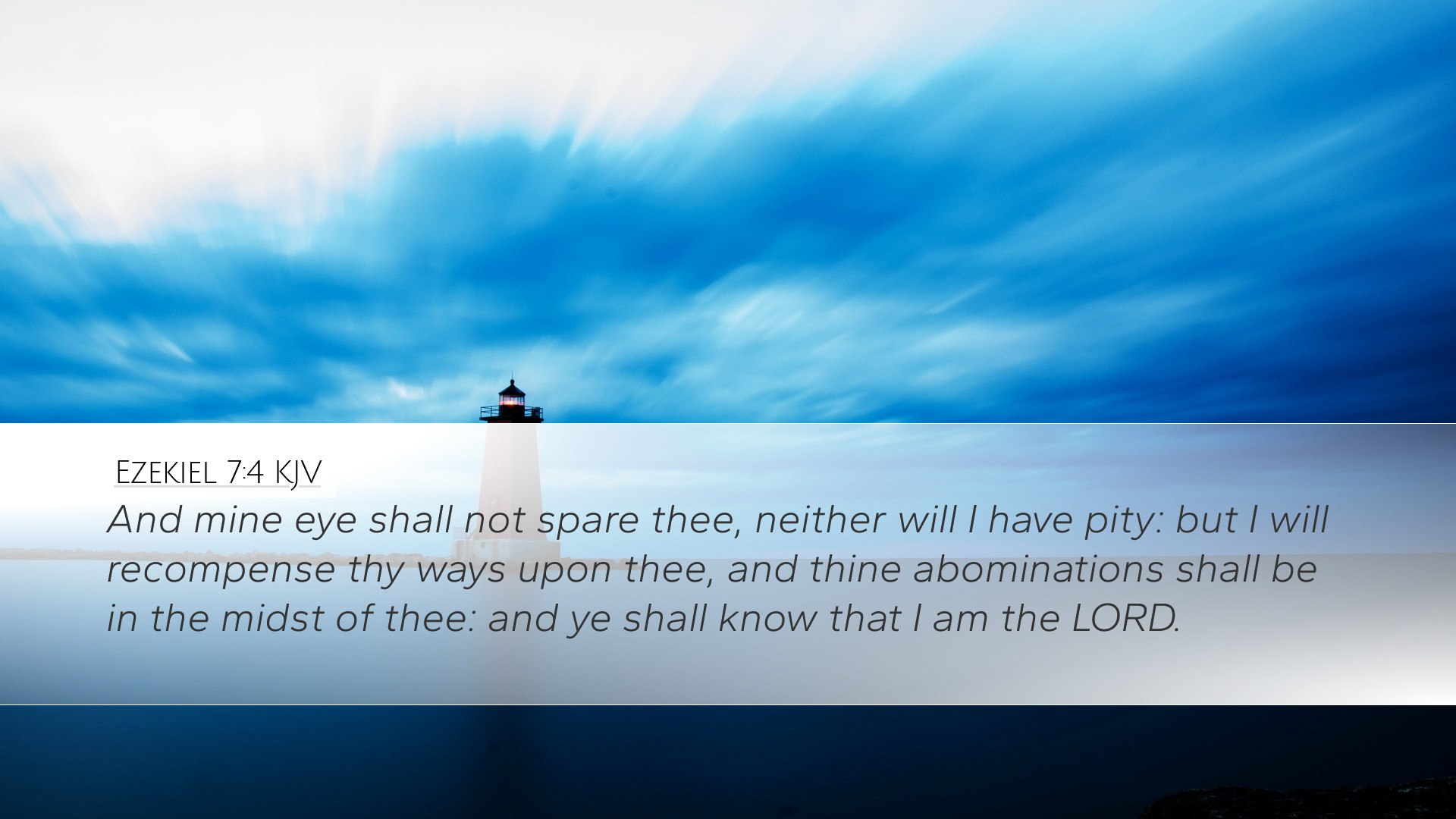Ezekiel 7:4 Commentary
Bible Verse: "And my eye shall not spare thee, neither will I have pity: but I will recompense thy ways upon thee, and thine abominations shall be in the midst of thee: and ye shall know that I am the LORD."
Introduction
The prophetic literature of Ezekiel opens a profound discourse on judgment, repentance, and the recognition of God's sovereignty. In Ezekiel 7:4, the Lord directly addresses the consequences of Israel’s idolatry and moral decay. This commentary seeks to distill insights from esteemed public domain commentaries, such as those by Matthew Henry, Albert Barnes, and Adam Clarke, offering a rich exploration of this pivotal verse.
Contextual Overview
The chapter situates itself in a context where Ezekiel is called to prophesy the upcoming calamity that would befall Jerusalem due to its persistent sinfulness. The declarations in Ezekiel 7 express the certainty of judgment and the reasons behind it, underscoring God's unwavering justice.
Key Themes
- Divine Judgment: The prominent theme is God's declaration of impending judgment. This aligns with the consistent message of the prophetic books where sin leads to retribution.
- Lack of Pity: God's refusal to show pity reflects the seriousness of Israel’s sin. The commentaries note that this indicates a point of no return where grace has ceased due to persistent disobedience.
- Self-Revelation of God: The phrase "and ye shall know that I am the LORD" reveals God's intention to make His sovereignty known through His actions.
Commentary Insights
1. Matthew Henry's Perspective
Henry emphasizes that the Lord’s message to Israel is one of urgency, where He highlights the complete lack of mercy due to their enduring rebellion. He interprets the phrase “my eye shall not spare” as a clear indication that God’s strict justice will be implemented without favoritism or leniency. Henry argues that the horror of their abominations would rise to their awareness, serving as a means of divine revelation.
2. Albert Barnes' Analysis
Barnes draws attention to the consequences of national sin, stating that while individuals may find forgiveness, the corporate sin of a people can lead to inevitable disaster. He notes that God’s recompense is not merely punitive; it serves to highlight the nature of sin and its ramifications. The mention of abominations in the midst of them signifies that their sins have become a part of their collective identity, suggesting a grievous moral contagion that spreads through the entire nation.
3. Adam Clarke's Commentary
Clarke provides a vivid illustration of the concept of recompense, suggesting that the "ways" of the people, characterized by their disobedience, would return upon their own heads. Clarke emphasizes the importance of the phrase "ye shall know that I am the LORD" as a fundamental revelation. This knowledge is not merely intellectual but experiential; it denotes the realization of God’s authority and the consequences of turning away from Him.
Theological Implications
This single verse encapsulates profound theological implications regarding sin, judgment, and the revelation of God. It challenges readers to consider their own lives and communities in light of God's standards.
- The Nature of God’s Justice: The uncompromising stance of God illustrates His holiness and commitment to justice.
- Awareness of Sin: The text compels both individuals and communities to recognize and mourn their spiritual failures as a precursor to repentance.
- God’s Sovereignty: The acknowledgment that situations of despair often lead to a greater understanding of God’s omnipotence and authority over all creation.
Practical Applications
The dire warnings contained in Ezekiel 7:4 serve as a clarion call for reflection and action among contemporary believers.
- Personal Reflection: Believers are urged to examine their lives for any abominations that may have taken root and lead to repentance.
- Community Awareness: Churches and communities must be vigilant regarding collective behaviors that go against God’s commandments, promoting accountability within congregations.
- Embracing God’s Mercy: While this verse emphasizes judgment, it also invites believers to seek God’s grace, realizing that acknowledging sin is the first step towards healing.
Conclusion
Ezekiel 7:4 stands as a sobering reminder of the reality of divine judgment amid human rebellion. The insights from Matthew Henry, Albert Barnes, and Adam Clarke deepen our understanding of the text’s implications for personal and communal faith practices. As scholars, pastors, and theologians engage with this verse, may it inspire a deeper commitment to living righteously in the sight of God, acknowledging His holiness, justice, and sovereignty.


